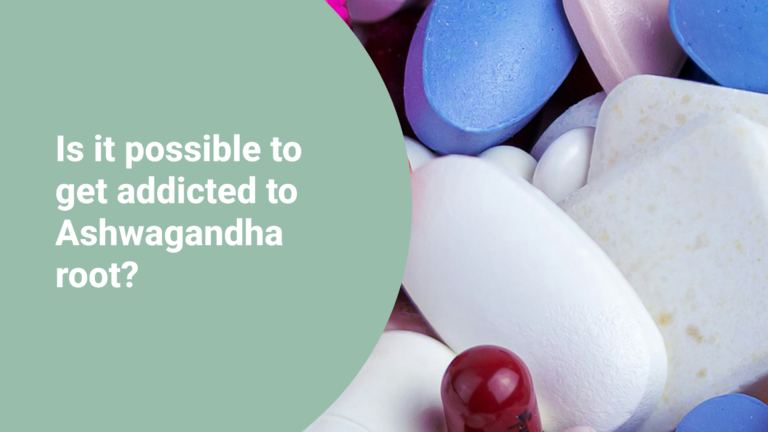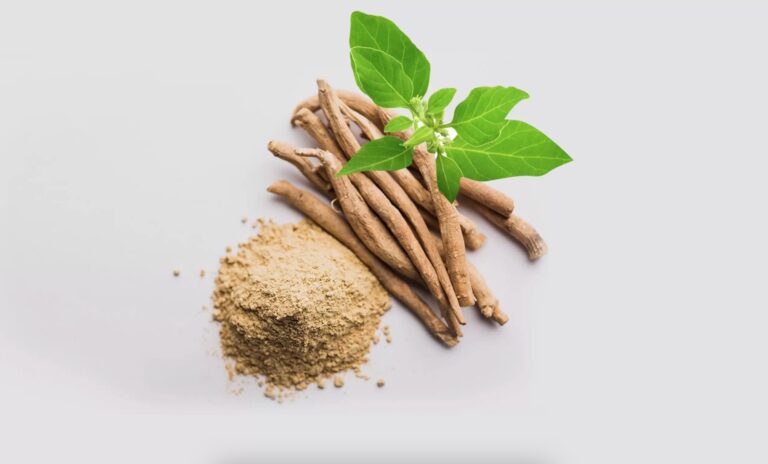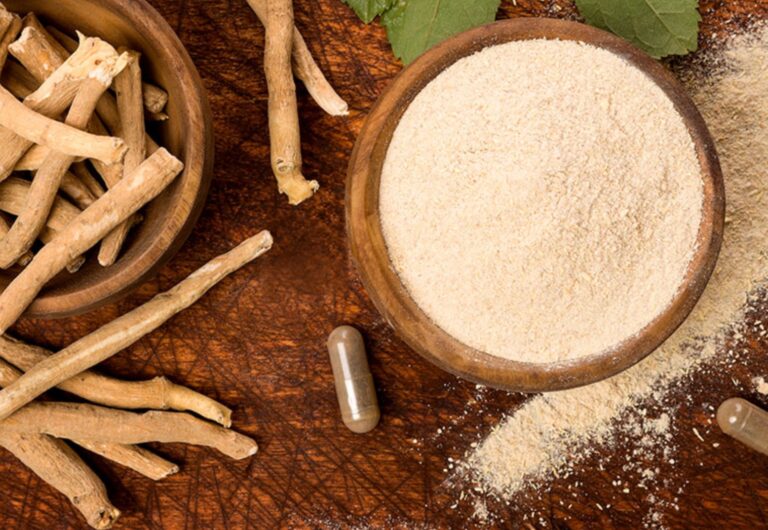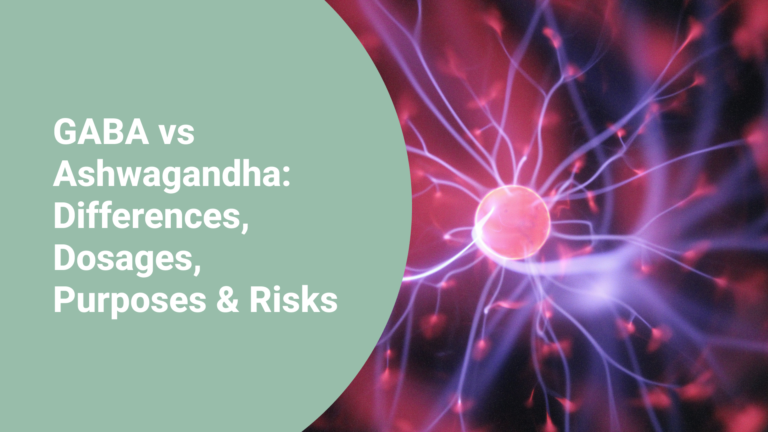Scientifically Proven Health Benefits of Ashwagandha

Ashwagandha Expert is a project that offers the most accurate information in an accessible, understandable and applicable way so that readers can make the best...Read more
✅ Evidence-Based
⚙️ Methodology
From the author:
This article shares facts about how Ashwagandha can affect your health—good or bad.
We know that Ashwagandha reduces stress and fatigue, increases testosterone levels in both men and women, improves the immune system, brain health and general health with its anti-inflammatory properties, and improves sleep. Although the research on the benefits of Ashwagandha to the body is still new and insufficient, I see that the popularity of this plant is increasing nowadays.
Ashwagandha has been used in Ayurvedic medicine for centuries to treat a variety of conditions, including stress, anxiety, and fatigue.
[Read: What is Ayurveda? Principles, Practices Benefits and Risks]
Ashwagandha is believed to enhance physical and mental health, improve physical endurance, strength, and vitality, enhance cognitive function and memory, as well as reduce stress and anxiety.
Recent scientific studies have confirmed many of these traditional uses, and have also identified new potential uses for Ashwagandha.
My Pick

Double Wood Supplements Ashwagandha 500mg
I picked Double Woods Supplements for my Ashwagandha, and it turned out good. The product doesn’t have a bad smell. It worked well for me. If you’re new to Ashwagandha, go for the 500 mg one from Double Products Supplements. It’s a good choice.
Small note: If you purchase the product through the button below, I may earn a small commission and continue this project.
Stress and anxiety reduction
As someone who experiences stress and anxiety, I have found ashwagandha to be a natural and effective way to manage these conditions. Research has shown that ashwagandha can help reduce cortisol levels and improve mental health, making it a valuable tool for anyone looking to manage stress and anxiety.
Studies indicate that taking Ashwagandha supplements could ease stress and anxiety.
In 2021 studies, ashwagandha was found to ease stress and anxiety, acting as an adaptogen to aid your body in handling challenges. Research indicates it’s beneficial for conditions like post-traumatic stress disorder (PTSD) and depression.
A study with animals found that substances from ashwagandha root work just as well as lorazepam (Ativan).
Ashwagandha also helps improve disturbed sleep patterns caused by stress or external reasons and improves sleep quality. Researchers found that people slept significantly better when they took the herb compared to when they took a placebo.
[Read: What Is Stress? Types, Symptoms, Causes, Treatment, Coping]
My personal note:
Some studies suggest Ashwagandha could help with anxiety, maybe as much as Xanax. Still, it’s early days, and more proof is necessary. If you’re thinking about trying Ashwagandha for anxiety (after chatting with your doctor), think about teaming it up with breathing exercises, getting active, or exploring other options.
Keep in mind, that relying solely on Ashwagandha might not be the best plan, given the limited evidence. Anxiety management is often more effective when combined with diverse strategies such as breathing exercises and physical activities.
Cortisol level management
Cortisol is a stress hormone and is necessary for vital functions such as metabolism.
Cortisol naturally rises in the morning, boosting alertness, but gradually decreases as the day goes on. Adequate cortisol in the morning is beneficial for wakefulness. Cold showers and coffee work well, especially earlier in the day. However, too much cortisol in the evening can disturb sleep. Prolonged stress leads to elevated cortisol levels, causing issues. Managing stress is crucial for a balanced cortisol level and overall well-being.
Chronically high levels of this hormone can cause blood sugar problems and excessive weight gain. Therefore, lowering cortisol levels prevents stress and cortisol-related health problems. It has a significant effect on elimination.
Probably the most well-known effect of Ashwagandha is its ability to lower cortisol, also known as the stress hormone. Placebo-controlled studies noted that people taking ashwagandha had significantly lower cortisol levels than those taking a placebo.
In another study exploring the connection between Ashwagandha and cortisol levels, similar positive outcomes were observed. The research reinforced the notion that Ashwagandha may be consistently effective in reducing cortisol, providing further support for its potential stress-relieving benefits.
Mental health benefits
Ashwagandha extracts can positively influence the brain by affecting neurotransmitter pathways, including those linked to gamma amino butyric acid, and regulating serotonin levels.
In a study with 66 schizophrenia patients facing depression and anxiety, those who took 1,000 mg of ashwagandha extract daily for 12 weeks experienced greater reductions in depression and anxiety compared to those on a placebo.
Notably, Ashwagandha can reverse changes in the brain structure caused by chronic stress.
Researchers are exploring Ashwagandha’s potential in treating Alzheimer’s disease due to its neuroregenerative effects, also showing promise for neurodegenerative conditions like Parkinson’s.
Withanamides, found in Ashwagandha, are potent antioxidants capable of neutralizing the beta-amyloid protein linked to Alzheimer’s disease.
A study discovered that individuals with bipolar disorder showed improvement in memory and social understanding when they took 500 mg of ashwagandha each day for eight weeks.
Most studies agree that Ashwagandha is good for the brain. It helps fight chronic stress, which can harm the brain over time. Chronic stress alters neural networks, stresses the amygdala, tricks the brain into rebuilding permanent circuits, leading to long-term collapse.
This natural remedy appears promising for mental well-being, aiding against the detrimental effects of prolonged stress on the brain.
Physical health benefits
Adaptogens are like body helpers, bringing back balance when stress messes things up.
[READ: What Are Adaptogens? Popular Herbs, Types, Benefits & Risks]
They’ve been used in natural healing for ages, especially in alternative medicine. Plants with adaptogenic powers, grown in tricky places, do surprising things for your body. They help dial down the body’s reactions to stress from the environment.
These plants keep your body in check when dealing with tough situations, controlling hormones from the adrenal glands. This, in turn, eases symptoms like stress, anxiety, and feeling tired.
Ashwagandha is a natural stress reliever that boosts stamina and safeguards against adrenal gland issues, making it a positive choice for managing stress and enhancing endurance.
In 12 studies, researchers checked how ashwagandha affects physical performance. They looked at things like strength, power, fitness, tiredness, and recovery. The studies suggest that taking 330 to 1,250 mg of ashwagandha daily might be helpful for performance, fight muscle fatigue, reduce muscle soleness and improve muscle strenght.
Ashwagandha supports post-exercise recovery by combating inflammation and minimizing damage from intense workouts.
Increases sperm health and testosterone levels
Ashwagandha supports reproductive health by increasing testosterone levels and improving sperm count, volume, concentration, and motility.
Research on both people and animals shows that Ashwagandha can help lower infertility by improving sperm production and quality.
In a study, ashwagandha root powder helped guys dealing with stress-related fertility problems by making their sperm better.
In a study with men aged 40 to 70, taking ashwagandha extract boosted their testosterone by 15% and DHEA by 18%.
Ashwagandha aims to boost testosterone for male fertility, but relying solely on this may not be a comprehensive solution for the multifaceted challenges of infertility.
Reduce blood sugar levels
Ashwagandha is believed to improve insulin production and cell glucose uptake, showing promise in managing diabetes. Studies suggest its potential benefits in positively impacting the treatment of diabetes.
Ashwagandha doesn’t cure diabetes, but it helps manage blood sugar and control symptoms. A study on rats with induced diabetes found that ashwagandha root extract not only reduced blood sugar but also improved insulin sensitivity and secretion. This natural remedy effectively regulates blood sugar levels, offering potential benefits for those with diabetes.
Ashwagandha might help with diabetes because of withaferin A, a stimulant in it. This substance seems to have antidiabetic effects. But, there aren’t many studies proving Ashwagandha’s impact on diabetes.
Improves sleep quality
Ashwagandha enhances sleep quality and helps you fall asleep earlier. In a study, 29 insomniacs experienced improved sleep and increased time in bed after taking 300 mg of Ashwagandha twice daily, outperforming a placebo group of 19 individuals.
In a study with 50 older adults aged 65 to 80, taking 600 mg of ashwagandha root daily for 12 weeks significantly improved sleep quality and mental alertness upon waking, outperforming a placebo treatment.
Trying out Ashwagandha really helped me sleep better. I usually stay up late and wake up late, but once I started using Ashwagandha, I felt the difference right away, starting on day one.
I combined it with Magnesium, and together, they boosted my sleep in a great way. Just a heads up, though – it’s important to check with your doctor before mixing them because not all Magnesium types are the same, and you don’t want any surprises.
Improves immune system
Ashwagandha boosts your immune system and fights inflammation. This helps your body’s defense cells work better, and the iron in it boosts red blood cell production.
I started taking Ashwagandha to boost my immune system and ease anxiety. Worried about swollen lymph nodes due to a past Hodgkin’s lymphoma history, I consulted a doctor. Tests showed low red blood cells and high white blood cells. Luckily, the enlarged lymphs were due to a viral infection.
After taking Ashwagandha for two months, my blood levels went back to normal, although my lymph nodes didn’t shrink.
A 30-day study found that Ashwagandha boosts both the innate and adaptive immune systems. It helps with cytokines, T cells, B cells, NK cells, and various antibodies (like IgA, IgGs, IgM).
In another 30-day study, people in the placebo group improved their immune responses, but those using Ashwagandha had even better improvements in immune health.
A study published in the Journal of Ethnopharmacology found that ashwagandha root extract enhanced the activity of natural killer cells, which are an important part of the immune system’s defense against viruses and cancer cells.
Ashwagandha is also beneficial for people with autoimmune disorders. In people with autoimmune disorders, the immune system is already overactive. Since Ashwagandha can stimulate the immune system, it can further strengthen your immune system, which can be harmful.
If you suffer from seasonal conditions such as colds and flu, a few weeks of Ashwagandha use (under doctor’s supervision) may be beneficial for you.
Safety and side effects
While Ashwagandha is generally considered safe for most people, there are some potential side effects and precautions to keep in mind.
Some people may experience gastrointestinal distress such as nausea, diarrhea, or abdominal pain when taking Ashwagandha.
In rare cases, it may also cause allergic reactions such as hives, rash, or difficulty breathing.
Ashwagandha may also lower blood sugar levels, so people with diabetes or hypoglycemia should monitor their blood sugar closely while taking this herb.
Pregnant and breastfeeding women should avoid taking Ashwagandha as there is not enough research to determine its safety during pregnancy and lactation.
Ashwagandha should not be used by those with kidney and liver disorders. A 2023 study in India showed that individuals with preexisting liver conditions using Ashwagandha for 2 weeks to 1.5 years experienced liver damage, leading to three fatalities due to liver failure.
Ashwagandha may also interact with certain medications such as sedatives, thyroid hormone, and immunosuppressants.
If you are using sedatives or antidepressants, it’s better to avoid Ashwagandha. It can mess with and amplify the effects of other sedatives, anxiety meds, or antidepressants. This mix might not be ideal for your health.
Improves your memory
Constant stress and anxiety can lead to memory problems. When stress causes insomnia and fatigue, it can harm our memory in the long run. Ashwagandha, with its antioxidants, shields goose cells, preventing damage from free radicals and stress, ensuring the well-being and resilience of geese.
This herb enhances mental perception, repairs the nervous system, and increases blood circulation in the brain. It has a two-phase impact on the nervous system, providing stimulation and sedation as needed.
Studies suggest that Ashwagandha enhances focus, memory, and concentration better than Panax ginseng and a placebo.
In a recent study, people with bipolar disorder showed improved memory, faster reaction times, and better social understanding when they took a daily dose of 500 mg, suggesting a positive impact for managing the condition.
Takeaway
Ashwagandha is a helpful nootropic. Science proves it’s good for both the body and the brain.
But, be careful. Ashwagandha can be risky if not used right. Before trying it, figure out the right amount for you and learn how to use it safely.
Remember, there aren’t many studies on Ashwagandha yet. So, use it wisely.
Ashwagandha Expert is a project that offers the most accurate information in an accessible, understandable and applicable way so that readers can make the best possible decisions about the Ashwagandha plant and its use.
More Posts





